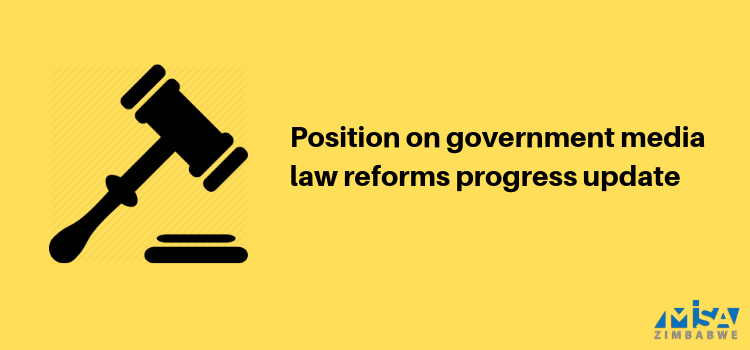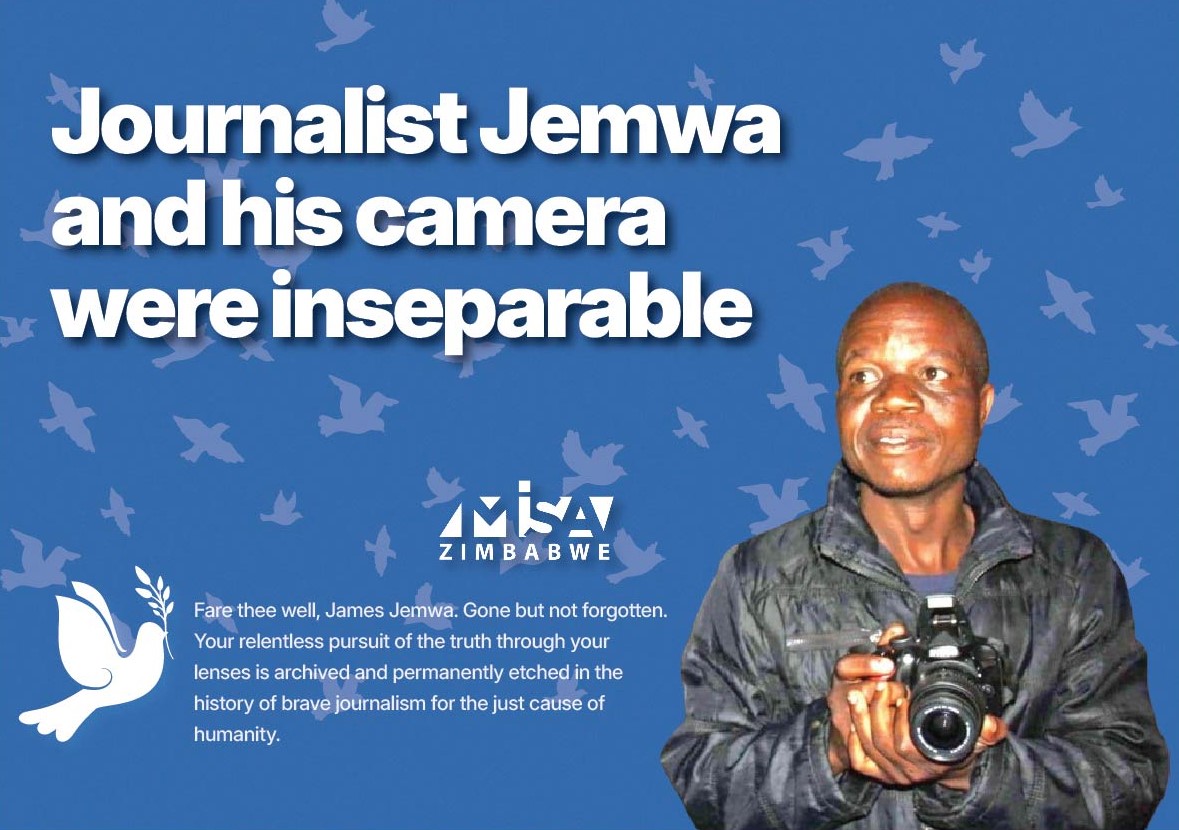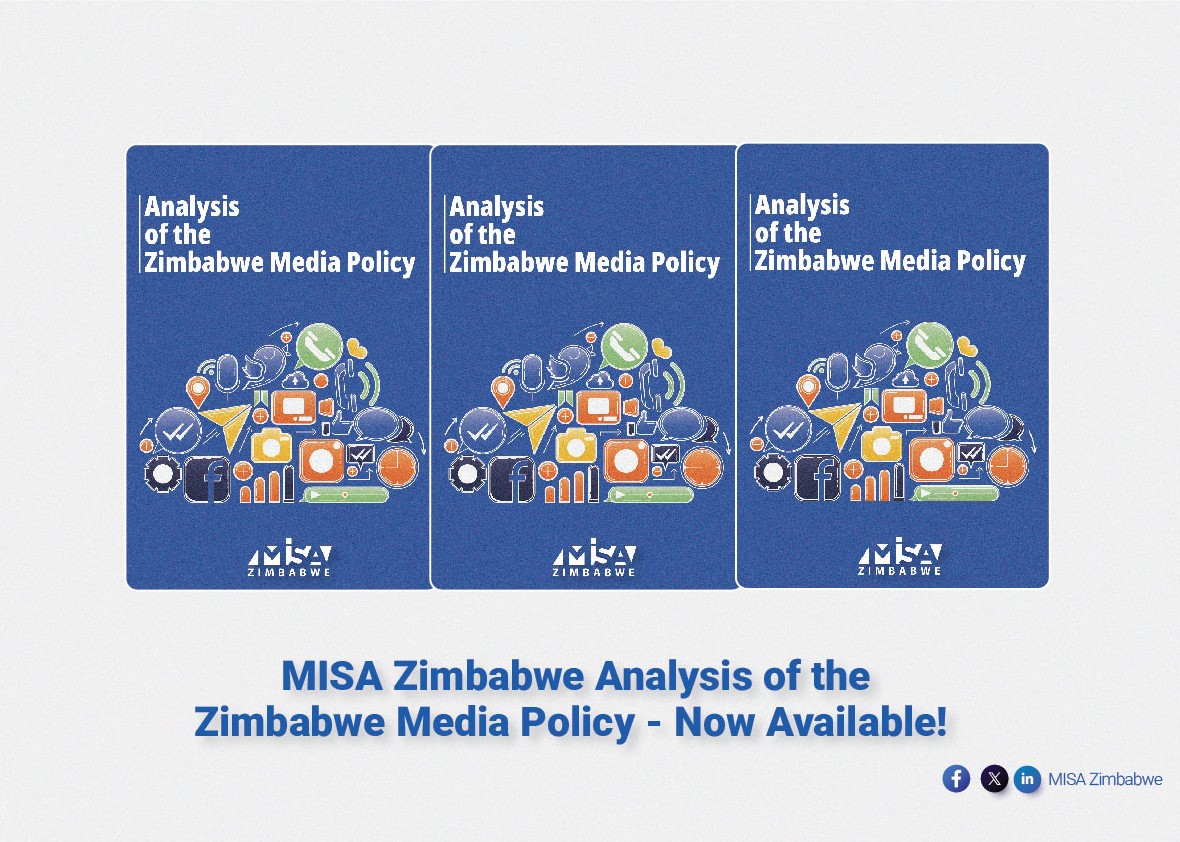On 20 May 2019 Permanent Secretary in the Ministry of Information, Publicity and Broadcasting Services, Nick Mangwana, held a progress update meeting on the media law reform process.
The meeting provided an opportunity to discuss other media-related issues such as licensing of community radio stations, the appointment of the Broadcasting Authority of Zimbabwe’s board, as well as progress on Zimbabwe’s migration to digital broadcasting.
Update on AIPPA repeal
The Zimbabwe government has so far based its media law reform process on the repeal of the Access to Information and Protection of Privacy Act (AIPPA). This law currently regulates three broad areas of law namely, access to information, data protection and regulation of the media industry.
This came after government conceded to breaking AIPPA into three Bills, i.e. the Freedom of Information Bill, Protection of Personal Information Bill and Zimbabwe Media Commission Bill. The Broadcasting Services Act will also be duly amended.
Mangwana told the meeting that Cabinet had so far approved the Freedom of Information Bill. He said the Bill would most likely be gazetted at the end of this week. A Bill is gazetted by publishing it in a Government Gazette, once published the Bill is tabled for debate in Parliament, the Senate and the public.
The other Bills set to replace AIPPA, and the Broadcasting Services Amendment Bill, are still at drafting stages in the Attorney General’s Office. The Permanent Secretary could not give concrete timelines as to when the Bills would be finalised and tabled before Parliament.
There are currently no timelines or indications of whether other statutory provisions that restrict media freedom will actually be reviewed and amended or repealed. Contrary to popular belief, it is the Criminal Law (Codification and Reform) Act that has generally been used to violate media freedoms in Zimbabwe, when compared with AIPPA.
Crimes found in the Criminal Law Code such as the publishing or communicating false statements prejudicial to the State, or undermining the authority of the President, have been used to punish offenders for publication of information that portrays the State or President in an unflattering manner.
Update on the Broadcasting Authority of Zimbabwe Board
The Broadcasting Authority of Zimbabwe (BAZ) is established in terms of the Broadcasting Services Act. The BAZ is run by a 12-member Board working with a BAZ secretariat. It is the Board that is responsible for the drafting of policy guidelines for the broadcasting sector, overseeing the implementation of this policy including other tasks such as the licensing of new television and radio broadcasting players, in line with the principal act.
The President in consultation with the Minister of Information, Publicity and Broadcasting Services, and Parliament’s Committee on Standing Rules and Orders, appoints the 12-member Board. BAZ has gone for a number of years without a Board. Government has not offered suitable explanations as to why this has been so.
The absence of a Board has according to various government representatives, hindered the licensing of community radio stations. However, absence of the Board in question did not hinder the issuing of Video on Demand licenses to entities such as Econet, Alpha Media Holdings, and PowerTel at the beginning of 2018.
In his address, Mangwana revealed that he was expecting the Board to be appointed soon. He further stated that the President was currently deliberating on a list of possible members to the BAZ Board. He did not reveal who the individuals under consideration for these appointments were.
Update on Issuing of Broadcasting Licenses
Mangwana remarked that Zimbabwe has completed 37% of its migration process to digital migration. The digitisation process will open up more space for television channels with Mangwana saying Zimbabwe expected to have 24 more television channels.
It is important to note that these 24 channels will not automatically translate to the licensing of 24 different broadcasting players running a channel each. Indeed, Mangwana stated that the Zimbabwe Broadcasting Corporation would control a “chunk” of the stations that would be availed through the ongoing digitisation process.
If the 2013 licensing of regional commercial radio stations is anything to go by, then future broadcasting licenses will most likely continue to be issued to State owned enterprises such as the ZBC and Zimpapers, or entities owned by individuals with ties to government and in some instances, direct connections to the ruling party.
Restrictions on the amount of foreign ownership and investment into the broadcasting sector, limit the ability of private players to raise the hefty capital injection needed to launch and sustain a viable broadcasting venture.
Currently, the Broadcasting Services Act prohibits the licensing of any broadcaster that uses equipment bought through foreign contributions or equipment donated wholly or in part by a foreign entity.
Furthermore, foreigners can only hold up to 20% ownership in local broadcasting enterprises. This position has not changed in the draft Bills MISA Zimbabwe has seen so far. Mangwana revealed that government is considering increasing this to 49% ownership. This remains to be seen.
According to Mangwana, the absence of a BAZ Board has held up the drafting of the policies needed to initiate digital broadcasting in the country. Research carried out as part of MISA Zimbabwe’s DTT Report, reveals that the digital migration process is complete in Harare and Bulawayo.
However, there is need for policies to set out the distribution and pricing of the Set Top Boxes (STBs) or decoders that consumers would need to receive digital transmission in their homes.
Such policies should by law, come from the BAZ Board. However, Mangwana revealed that his Ministry was currently drafting policies on behalf of the absent Board. He did mention that once a Board is appointed, his ministry would hand over the draft Regulations for the Board to finalise.
That notwithstanding, it is unlikely that the Board will make any marked changes to drafts handed down by the Board’s parent ministry. This undoubtedly, affects and compromises the Board’s overall independence.
Mangwana further revealed that his Ministry was working on other draft policies such as the Media and Film Policy, that would also clearly set out definitions of community radio stations and how these would be licensed.
Beyond the alignment process
MISA Zimbabwe seeks to reiterate its position that beyond the two laws that are on the Ministry of Justice Legal and Parliamentary Affairs schedule, namely AIPPA and BSA, there are a plethora of other laws that violates the rights to privacy, freedom of expression and media and the right to information as espoused in sections 57, 61 and 62 of the Constitution of Zimbabwe. It is with this in mind that the organisation reminds the government of its obligation towards compliance with the Constitution, upholding its supremacy and defending it through ensuring that laws that are not in sync with the charter are struck off the statute books.
In this regard, the government should urgently look into other offending laws such as the Zimbabwe Broadcasting Corporation (ZBC) Commercialisation Act; Interception of Communications Act; Criminal Law (Codification and Reform) Act; Official Secrets Act; Censorship and Entertainment Controls Act, among others.
MISA Zimbabwe reiterates that these reforms must be in harmony with the relevant constitutional provisions, regional and continental instruments, and best practices.
Media law reform and other issues relating to broadcasting in Zimbabwe will be discussed in more depth during the MISA Zimbabwe’s inaugural Broadcasting Conference to be held on 18 and 19 June 2019.













